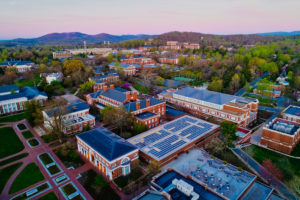Solar Power and Sustainability at UVA
Written by Andrea Trimble, UVA Sustainability Director
In pursuit of an ambitious UVA Sustainability Plan to reduce the University’s environmental footprint and to provide associated educational opportunities, UVA is advancing the evaluation and installation of renewable energy both on and off Grounds. UVA’s five-year Sustainability Plan compiles new ideas, as well as feedback generated over the past several years, while building upon the University’s many existing initiatives and accomplishments to continue to advance sustainability. It puts forth new and existing goals with over one hundred actions to move toward those goals as well as achieving a longer-term vision, striving for the vitality of our environment, both locally and globally.
Last fall, UVA and the Darden School of Business signed an agreement with Dominion Virginia Power to purchase the entire electric output from an off-Grounds, utility-scale solar photovoltaic (PV) project, which, when completed in late 2018, will account for approximately 12% of UVA’s electricity footprint. This Hollyfield project, consisting of of 65,000 panels on 160 acres in King William County, has peak capacity to power the equivalent of up to 4,250 average homes.
On Grounds, solar panels have been installed on Clemmons Library, Skipwith Hall, Ruffner Hall, and the UVA Bookstore, all within the past year and a half. The 126 kW solar PV array (324 panels) on Clemmons Library was dedicated by Governor McAuliffe in April and is estimated to provide up to 15% of the building’s electricity use. The 15 kW solar PV project on the newly-constructed Skipwith Hall building is paired with a green roof. Additionally, the 450 kW of solar panels in operation atop Ruffner Hall and the UVA Bookstore feed directly into the electric grid as part of Dominion’s Solar Partnership Program.
UVA’s recently released Greenhouse Gas Action Plan outlines a strategy to achieve the greenhouse gas reduction goal endorsed by the BOV (a 25% reduction below 2009 levels by 2025), which will also help the University achieve its nitrogen reduction goal. As of 2016, UVA has reduced emissions by 11%, despite significant growth. In addition to the current renewable energy installations, the plan includes pursuing at least one additional utility-scale project, if not more, as well as expanding the amount of solar power on UVA’s existing and new rooftops, to help meet these targets. If achieved, renewable energy could account for up to 30% of the total emissions that UVA has committed to reduce by 2025.

In addition to energy generation, UVA is focused on energy efficiency and reducing energy consumption across UVA’s building portfolio. Projects are being identified and implemented in the areas of district energy plant improvements, individual building optimization, systematic technology deployment (i.e. LED lighting), and strategies to increase awareness on how individuals can help reduce energy use.
The various intersections of operations, academics, research, and engagement are important as UVA develops these sustainability programs and initiatives. “Using the Grounds as learning tool through collaboration between academic and operational units” is one of the 23 goals outlined in UVA’s Sustainability Plan. For example, an on-Grounds solar roadmap is being developed via collaboration across the Committee on Sustainability, the Office for Sustainability, Facilities Management, and a group of students in the School of Engineering and Applied Science’s Introduction to Green Engineering class, to identify and prioritize the best opportunities on Grounds. The roadmap evaluates over 550 roofs at UVA for solar potential, age of roof, visibility, and other criteria. Additionally, metered data from the solar panels, available via a soon to be released Solar Tracker website, will provide students and researchers with on-Grounds experiential learning opportunities.
UVA Sustainability welcomes and encourages collaboration and involvement. To learn more or to get involved, visit: https://sustainability.virginia.edu/
- Having a Drink With Your Donkey: The Absurd in Antiquity
- What Happens to UVA’s Recycling? A Behind the Scenes Look at Recycling, Composting, and Reuse on Grounds
- Finding Your Center: Using Values Clarification to Navigate Stress
- UVA Club of Atlanta: Virtual Pilates Class
- UVA Club of Fairfield/Westchester: Cavs Care - Food Pantry Donation Drive
- UVA Club of the Triangle: Hoo-liday Party
